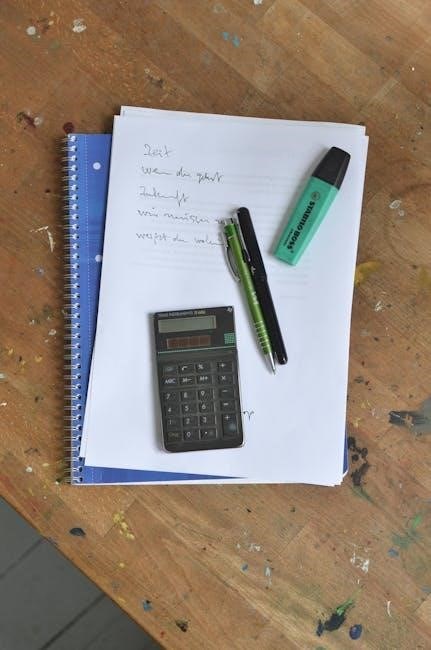gcse maths paper 1 2023 pdf

Overview of GCSE Maths Paper 1 2023
GCSE Maths Paper 1 2023 is the first exam in the series, focusing on core mathematical concepts. It is a non-calculator paper, testing foundational skills and problem-solving abilities. Available for both Foundation and Higher Tiers, it covers essential topics like number, algebra, and geometry. The paper is similar across Edexcel, AQA, and OCR, with slight variations in content focus. Designed to assess understanding and application, it is a critical component of the GCSE Maths curriculum, setting the tone for the second paper.
1.1 Key Features of the 2023 Exam
The 2023 GCSE Maths Paper 1 is a non-calculator exam, lasting 1 hour 30 minutes. It includes 80-100 questions, focusing on number, algebra, geometry, and statistics. The paper is consistent across Edexcel, AQA, and OCR, with slight variations in content emphasis. It assesses foundational skills and problem-solving abilities, preparing students for Paper 2.
1.2 Importance of Paper 1 in the GCSE Maths Curriculum
GCSE Maths Paper 1 is crucial as it assesses core mathematical skills and problem-solving abilities. It focuses on foundational concepts like number, algebra, and geometry, ensuring students have a solid grasp of basics. Serving as the first exam, it sets the tone for Paper 2 and is essential for building confidence and fluency in maths.

Accessing GCSE Maths Past Papers
Past papers for GCSE Maths are essential for revision. The 2023 Paper 1 PDFs are available for Edexcel, AQA, and OCR boards, offering mark schemes and model answers for free download.
2.1 Where to Find GCSE Maths Paper 1 2023 PDF
GCSE Maths Paper 1 2023 PDFs are available on official exam board websites such as AQA, Edexcel, and OCR. Additionally, educational platforms and revision sites offer free downloads of past papers, mark schemes, and model answers to aid student preparation and practice effectively for their exams.
2.2 Official Sources for Edexcel, AQA, and OCR Papers
Official sources for GCSE Maths Paper 1 2023 PDFs include exam board websites: Edexcel, AQA, and OCR. These sites provide direct access to past papers, mark schemes, and examiner reports, ensuring authenticity and reliability for student revision and practice.
2.3 How to Download Past Papers and Mark Schemes
To download GCSE Maths Paper 1 2023 PDFs, visit the official websites of Edexcel, AQA, or OCR. Navigate to the “Past Papers” section, select the desired year and series, and download the PDFs for free. Mark schemes and examiner reports are also available for comprehensive revision.
Structure of GCSE Maths Paper 1
GCSE Maths Paper 1 is a non-calculator paper, featuring a mix of question types, including multiple-choice and open-response questions. It covers core topics like number, algebra, geometry, and statistics, with a focus on foundational skills and problem-solving. The structure is consistent across exam boards, ensuring a balanced assessment of mathematical understanding and application.
3.1 Format and Content of the Paper
GCSE Maths Paper 1 2023 is a non-calculator paper, divided into sections with varying mark allocations. It includes multiple-choice and open-response questions, covering core topics like number, algebra, geometry, and statistics. The format ensures a balanced assessment of foundational mathematical understanding and practical problem-solving skills, reflecting the curriculum’s emphasis on both fluency and reasoning.
3.2 Question Types and Difficulty Levels
GCSE Maths Paper 1 2023 features a mix of multiple-choice, short-answer, and open-response questions. Difficulty levels range from basic recall to complex problem-solving, ensuring a comprehensive assessment of mathematical skills. The paper is designed to challenge students across all ability levels, with questions progressing from straightforward to more intricate, requiring critical thinking and application of concepts.
3.3 Calculator and Non-Calculator Sections
GCSE Maths Paper 1 2023 is a non-calculator exam, focusing on core mathematical skills and mental arithmetic. This contrasts with Papers 2 and 3, which allow calculators for more complex calculations. The non-calculator format ensures students demonstrate foundational numeracy and problem-solving abilities without reliance on technology, aligning with curriculum goals.
Grade Boundaries and Mark Schemes
Grade boundaries define the marks required for each grade in GCSE Maths Paper 1 2023. Mark schemes detail how marks are awarded for each question, ensuring fair assessment across all exam boards.
4.1 Understanding the Grading System for 2023
The 2023 grading system for GCSE Maths ranges from Grade 9 (highest) to Grade 1, with U indicating ungraded. Paper 1 contributes significantly to the overall grade, using a balanced scale to reflect student performance accurately. The system ensures consistency and fairness across different exam boards like Edexcel, AQA, and OCR, providing clear benchmarks for success.
4.2 Mark Scheme Details for Paper 1
The mark scheme for Paper 1 provides detailed breakdowns for each question, ensuring clarity in grading. It includes question-specific guidance, mark allocation, and exemplar answers. Available for both Foundation and Higher Tiers, the scheme aligns with exam board standards, offering transparency and precision in assessing student performance across all topics covered in the paper.
4.3 Grade Boundaries for Foundation and Higher Tiers
Grade boundaries for Paper 1 vary between Foundation and Higher Tiers. Foundation Tier typically ranges from Grade 1 to 5, while Higher Tier spans Grades 4 to 9. These boundaries are set by exam boards and adjusted annually based on paper difficulty, ensuring fair assessment across all students. They are published post-exam.
Exam Schedule and Timing
GCSE Maths Paper 1 2023 is scheduled in the morning session. Both Foundation and Higher Tier exams occur on the same day, ensuring a consistent timeline for all students. The exam lasts 1 hour and 30 minutes, allowing candidates to manage their time effectively without a calculator.
5.1 Dates for GCSE Maths Paper 1 in 2023
GCSE Maths Paper 1 2023 was held on June 2023. The exact date varied slightly across exam boards, but most students sat the exam in the morning session. This timing ensured consistency and fairness for all candidates, whether they were taking Foundation or Higher Tier exams.
5.2 Duration of the Exam
The GCSE Maths Paper 1 2023 exam lasted 1 hour and 30 minutes. This duration is consistent across all exam boards, including Edexcel, AQA, and OCR. The non-calculator format ensures students can demonstrate their mathematical skills without reliance on technology, providing a fair assessment for both Foundation and Higher Tier candidates.
5.3 Morning and Afternoon Sessions
GCSE Maths Paper 1 2023 was held in the morning session, typically between 9:00 AM and 10:30 AM. This timing applies to both Foundation and Higher Tier students across all exam boards, including Edexcel, AQA, and OCR. Morning sessions help maintain consistency and reduce exam-day stress for candidates.

Revision Strategies for Paper 1
- Focus on past papers and model answers to understand question patterns and marking criteria.
- Use video solutions and mark schemes to improve problem-solving skills and time management.
- Identify weak areas and practice regularly to build confidence and accuracy.
6.1 Effective Use of Past Papers in Revision
Past papers are invaluable for understanding exam structure and content. They help identify recurring question types, improve time management, and refine problem-solving strategies. Students can practice under timed conditions, self-assess using mark schemes, and focus on weak areas. Regular practice with past papers enhances confidence, accuracy, and overall exam readiness.
6.2 Focus Areas for Foundation Tier Students
Foundation Tier students should concentrate on core topics like number operations, fractions, and basic algebra. Practicing ratio, proportion, and geometry questions is essential. Developing skills in word problems and graphical interpretation will also enhance performance. Regular review of mark schemes helps clarify expectations and strengthens foundational understanding for Paper 1 success.
6.3 Tips for Higher Tier Candidates
Higher Tier candidates should focus on complex problem-solving and advanced algebraic manipulation. Practicing past papers under timed conditions improves time management. Emphasize understanding of higher-tier-only topics like advanced geometry and trigonometry. Breaking down challenging questions into simpler steps ensures clarity and accuracy, maximizing scores in Paper 1.
Exam Boards and Their Specifics
Exam boards like Edexcel, AQA, and OCR offer distinct approaches to GCSE Maths Paper 1, with variations in content focus and question types, requiring tailored preparation strategies.
7.1 Differences Between Edexcel, AQA, and OCR
Edexcel, AQA, and OCR differ in their GCSE Maths Paper 1 content and structure. Edexcel focuses on problem-solving, AQA emphasizes core mathematical skills, and OCR integrates contextualised questions. Each board has unique question types and assessment styles, requiring students to adapt their strategies accordingly for optimal performance. Understanding these differences is crucial for effective preparation.
7.2 Paper 1 Specifics for Each Exam Board
Edexcel’s Paper 1 focuses on non-calculator questions, emphasizing algebra and number skills. AQA’s Paper 1 includes a mix of calculator and non-calculator tasks, with a strong emphasis on problem-solving. OCR’s Paper 1 prioritizes foundational mathematics, incorporating practical scenarios to test application. Each board tailors content to align with its curriculum framework, ensuring distinct assessment approaches.
7.3 Resources Available for Each Board
Edexcel, AQA, and OCR provide past papers, mark schemes, and model answers for Paper 1. Edexcel offers detailed exam guides, while AQA includes video solutions. OCR provides practice papers and revision checklists. All boards ensure resources are accessible online, helping students prepare effectively for their exams and improve their performance.

Results and Grade Protection
GCSE Maths results for 2023 were announced, with protections in place for the cohort due to COVID-19 disruption. Grades reflect a balanced approach, ensuring fairness across all students.
8.1 How Results are Calculated
GCSE Maths Paper 1 2023 results are calculated by combining marks from both papers, with grade boundaries set by exam boards. Adjustments were made to protect the 2023 cohort from COVID-19 impacts, ensuring fair grading across all tiers and exam boards like AQA, OCR, and Edexcel.
8.2 COVID-19 Impact on 2023 Grades
The COVID-19 pandemic influenced grading in 2023, with adjustments ensuring fairness. Exam boards implemented grade protection measures, maintaining consistency while accounting for disruption. This approach aimed to support students, particularly those taking GCSE Maths Paper 1, ensuring their efforts were accurately reflected in final results despite unprecedented challenges.
8.3 Post-Results Services for Students
Post-results services for students include grade reviews, appeals, and access to marked scripts. These services ensure transparency and fairness, allowing students to address concerns about their GCSE Maths Paper 1 results. Exam boards like AQA, Edexcel, and OCR provide detailed feedback to support students in understanding their performance and grades.

Practice Resources and Model Answers
Free GCSE Maths practice papers and model answers are available for Edexcel, AQA, and OCR. These resources include detailed solutions and video explanations, helping students master Paper 1 effectively.
9.1 Free Practice Papers and Solutions
Free GCSE Maths practice papers and solutions are available for Edexcel, AQA, and OCR exam boards. These resources include past papers, mark schemes, and model answers, providing students with comprehensive tools to practice and improve their performance in Paper 1. They are accessible online for easy download and revision.
9.2 Video Solutions and Mark Scheme Analysis
Video solutions and mark scheme analyses are valuable tools for understanding GCSE Maths Paper 1 challenges. Experts break down complex questions, offering step-by-step explanations and tips. These resources, available for Edexcel, AQA, and OCR, help students grasp exam techniques and improve their problem-solving skills effectively for better exam performance and confidence.
9.3 Model Answers for Paper 1 Questions
Model answers provide detailed, step-by-step solutions to GCSE Maths Paper 1 questions, showcasing correct methods and reasoning. Available for Edexcel, AQA, and OCR, these resources are free to download and cover both Foundation and Higher Tier questions. They help students improve their understanding and reduce errors, ideal for self-study or classroom use.
Exam Day Tips
Ensure you arrive early, stay calm, and bring all necessary materials. Manage your time wisely, read questions carefully, and attempt all sections systematically for optimal performance.
10.1 Preparing for the Morning of the Exam
Check the exam schedule and venue details. Gather all necessary materials, including pens, pencils, eraser, and calculator. Plan your journey to arrive early. Eat a light, nutritious breakfast for energy. Stay hydrated and mentally prepare with positive affirmations. Avoid last-minute cramming and ensure all devices are fully charged if required.
10.2 Managing Time During the Exam
Start by skimming the paper to identify easier questions. Allocate time evenly, spending no more than two minutes per question. Use the first five minutes to read and plan. Avoid lengthy calculations on tough questions early on. Ensure you attempt all sections, leaving time to review answers and correct errors.
10.3 Strategies for Tackling Challenging Questions
Break down complex problems into smaller, manageable parts. Use diagrams or visual aids to simplify concepts. Always read questions carefully, underlining key terms. Check your work as you go to catch errors early. If stuck, move on and return later to avoid time loss. Stay calm and methodical to approach each question confidently.
Weightage of Paper 1 in Final Marks
GCSE Maths Paper 1 contributes 50% of the final marks, making it equally important as Paper 2. Strong performance in both papers is crucial for a high overall grade. Balancing preparation and consistency across both exams ensures optimal results.
11.1 Contribution to Overall GCSE Maths Grade
Paper 1 contributes 50% to the final GCSE Maths grade, equally weighting with Paper 2. It assesses core mathematical skills, ensuring a strong foundation. Consistent performance in both papers is essential for achieving higher grades, as each paper evaluates different aspects of mathematical proficiency and application. Balanced preparation is key to success.
11.2 Balanced Approach to Paper 1 and Paper 2
A balanced approach to Paper 1 and Paper 2 is crucial, as both exams contribute equally to the final grade. Students should allocate study time evenly, ensuring mastery of both papers’ unique demands. Focusing solely on one paper may lead to gaps in skills, impacting overall performance and grade achievement.
11.3 Importance of Consistency Across Both Papers
Consistency across both papers is vital for achieving the best possible grade. Each paper assesses different skills, and underperforming in one can significantly impact the overall result. Students must ensure they allocate equal effort to both papers to maintain a balanced performance and maximize their final grade potential.
By focusing on consistency, students can avoid discrepancies in their results. Both papers test complementary skills, and strong performance in both ensures a well-rounded understanding of the curriculum. This balanced approach is key to securing higher grades and meeting target expectations effectively.
12.2 Encouragement for Students Preparing for Paper 1
GCSE Maths Paper 1 2023 is a critical assessment requiring thorough preparation. By leveraging past papers and focusing on key areas, students can achieve their desired grades. Stay confident, manage time effectively, and approach each question methodically to succeed.





